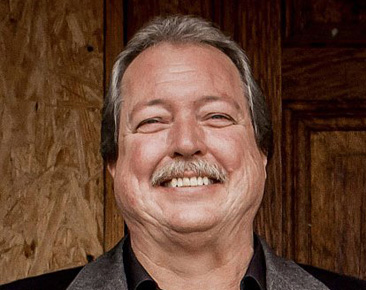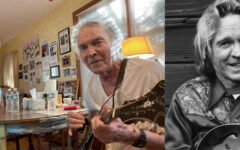
20 Questions with Katy Daley is a new, ongoing feature here at Bluegrass Today. The column may be new, but you all know the contributor, Katy Daley, a familiar voice from the Katy Daley Show each weekday morning at WAMU’s Bluegrass Country. As the situation allows, Katy will conduct interviews with bluegrass artists and personalities, bringing her wide knowledge of the music to bear. There won’t always be twenty questions, but you can be sure they’ll be good ones.
Here is Katy’s interview with IIIrd Tyme Out’s fearless leader, Russell Moore, who talks about how he got his first big bluegrass break.
 We all dream about making the big time. It takes talent, hard work and some good luck to get there. Last week at 2016 IBMA in Raleigh, Russell Moore talked with me about the leap of faith he and his band mates took that set his career success in motion.
We all dream about making the big time. It takes talent, hard work and some good luck to get there. Last week at 2016 IBMA in Raleigh, Russell Moore talked with me about the leap of faith he and his band mates took that set his career success in motion.
RM: It was me, Scott Vestal, his brother Curtis Vestal, and Marc Keller who was playing guitar and singing as well. This was about 1983 and we were living in Arlington, Texas – in the Dallas-Ft.Worth area. I had moved up there, maybe a year and a half earlier, from Pasadena to Arlington so we could play music as the band, Southern Connection. We were working construction jobs and doing other things to make ends meet.
KD: How old were you? About 20?
RM: I was about 19 or 20 about that time. Probably 19 when I moved up there. We were playing music as much as we possibly could but we were never able to reach that goal that we wanted, which was to play music full time and make our living playing music. We weren’t able to do that. We had performed at a place called the Blue Barn just outside of Cleveland, Texas when Doyle Lawson & Quicksilver were passing through. We got a phone call and we were asked to open the show for them that night.
KD: So that must have been quite a big deal.
RM: Yes! An extremely big deal. We were all big fans of Quicksilver’s music. In 1979 I was performing with another band, the Bluegrass Ramblers of Texas and when that first LP came out from Doyle Lawson & Quicksilver, the banjo player from our group came into a rehearsal one day just waving that LP over his head saying, “Boy, you guys have got to hear this.” He put it on and we were blown away. This is fresh. This is exciting. And the use of the electric bass in that way was a little bit foreign to bluegrass music I guess you could say. We became big fans of Quicksilver’s music. Then we got the opportunity to open for them and it’s like, “Wow! This is really cool!” What we didn’t know is that Doyle was listening to our performance that night.
KD: Doyle is always listening. He’s always listening.
RM: I came to know that, yes. He was instrumental in getting Milton Harkey, who promoted the Doyle Lawson & Quicksilver festival in Denton, North Carolina, to book us. Doyle told him, “These guys are good and you need to get them on your festival.” When that opportunity came up we thought, “we’re young, we’re not tied down to anything here in Texas, maybe we need to be where the mainstream is. Where there’s lots more festivals, more venues. Get over in the Carolinas somewhere.
So when we left Texas to go play the show in Denton, North Carolina, we basically sold everything we had except our instruments and our clothes. We had a trailer we pulled behind Scott’s van that Marc’s dad had built. When we left we took whatever we needed and played the festival. I remember Milton Harkey asking us, “So where you guys going from here?” And we said, “Well, we really don’t know.” He said, “What do you mean you don’t know? You have another show?” “No, no, we have some shows later in the year back out in Arkansas and Texas but we’re not going back now.”
KD: I’m Leaving You and Ft Worth, Too!
RM: Yes, we’re settling out here some place. He asked where we were settling and we said we don’t know. We have no idea yet. We need to look around to see what we like. We wound up settling in Asheville, North Carolina. While we were there we were playing six nights a week in and around the Asheville area. It was still a tough go. Small venues, small crowds and that kind of thing. Things were picking up as far as the festival scene goes. But then we opened again at Bill Stanley’s Barbeque.
Doyle Lawson & Quicksilver came in to play a show and we were able to open the show. A little while later, a few months after that, Doyle called and said that they were making a big change and he offered three of us – myself, Scott Vestal and Curtis Vestal – a position in his group. That’s when we moved across the mountain to Bristol, Tennessee and started working with Doyle in 1985. That was the start, for me anyhow, the start of the national scene because… boom, we were right in the thick of it then. You’re going from Bristol, Tennessee up into Maine and Canada, all the way down to Florida, going out to California and Washington State.
KD: You hit the big time.
RM: We’re gone. National and even international. Going to Europe. I think I went to Europe three different times with Doyle. We also did six weeks in Central and South America. It was eye-opening. It was unnerving sometimes. It was scary at times. Not just because I had never experienced any of this stuff. There was a legion of fans that Quicksilver already had. And when you make a big change like that there are some people who are very devoted to the people who had been there, and we had to try to win them over.
KD: And you did?
RM: I think we did, yeah. It wasn’t a thing that we were out there saying “we’re better than this one or better than that one.” They finally realized that all we were doing was trying our best to make the best music that we possibly could.
KD: So you really took a leap of faith and it paid off for you. Would you now, with all your experience in the music business, if a young bunch of 19-year-olds came to you and said they were going to sell everything and go play one festival… What would you tell them? Go for it?
RM: Yes, yes I would. When you’re 19 years old, Katy, there’s a freedom you have that doesn’t come around when you’re older, when you’re settled. It’s just not possible to do those things at that point. That was one of the biggest things on my mind on the decision to move East like that. Except for family, I didn’t have any ties to stay in Texas and I knew if I was actually going give this a chance to play bluegrass music full time, that it was time to do it right then. Because if it wasn’t going to work out, I figured that in a few years, and I realized there’s no future in it for me, I’m still young enough that I can go into another field and live my life. So yeah, I think if you’re going to do that do it while you’re young, while you’re unattached.
KD: As a fan of you and your music for many, many years, I’m really glad you took that leap of faith and that you made the big time. You told me this story years ago and it amazed me that anyone would have the guts to do what you did. I’m glad to get you to tell this story again.
RM: I appreciate your asking about it again. It was a very special time in my life and my career. Everything happens for a reason. If we had never moved East and settled in Asheville, North Carolina I would never have met my wife, Carol. We’ll be celebrating 31 years in November. She was there going to Western Carolina University. We met while I was living there through a good friend of hers when they came out to see us perform. Things like that. If I hadn’t moved East, the opportunity to meet my wife never would have happened, getting the phone call to join Doyle Lawson’s band probably wouldn’t have happened. So it was the way things were supposed to happen. I look back on it all fondly.
KD: Thank you.
RM: You’re welcome.







